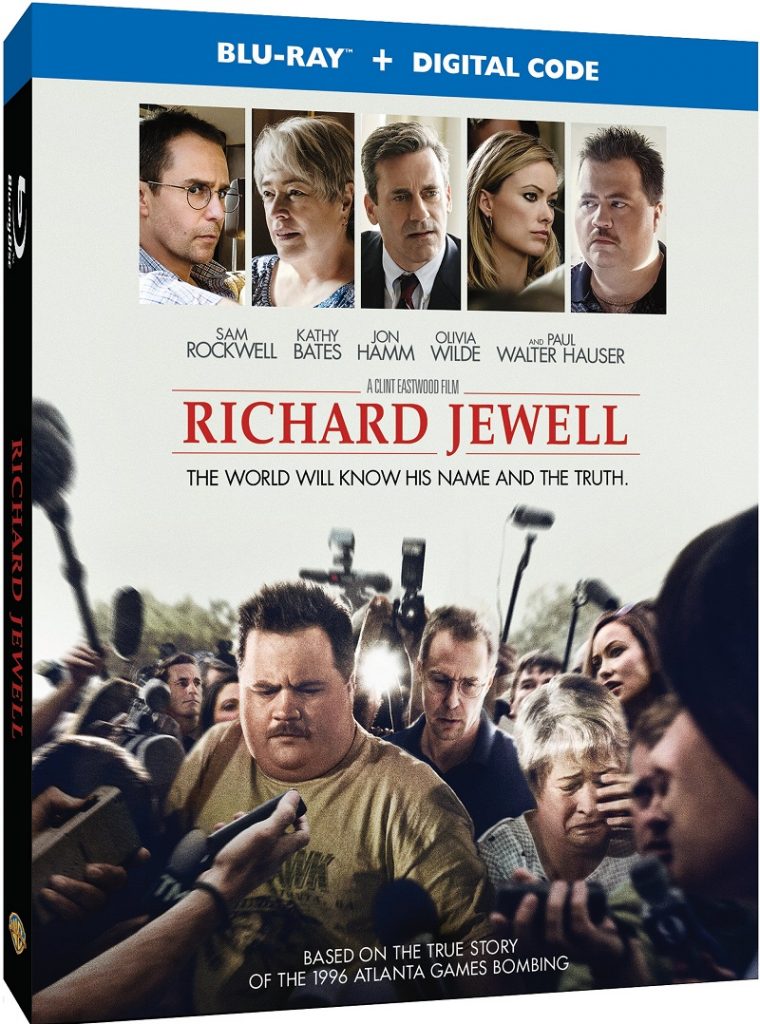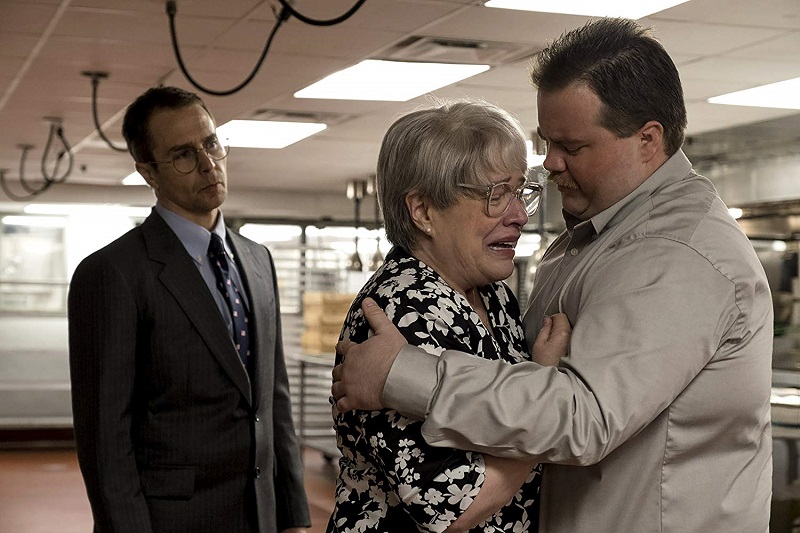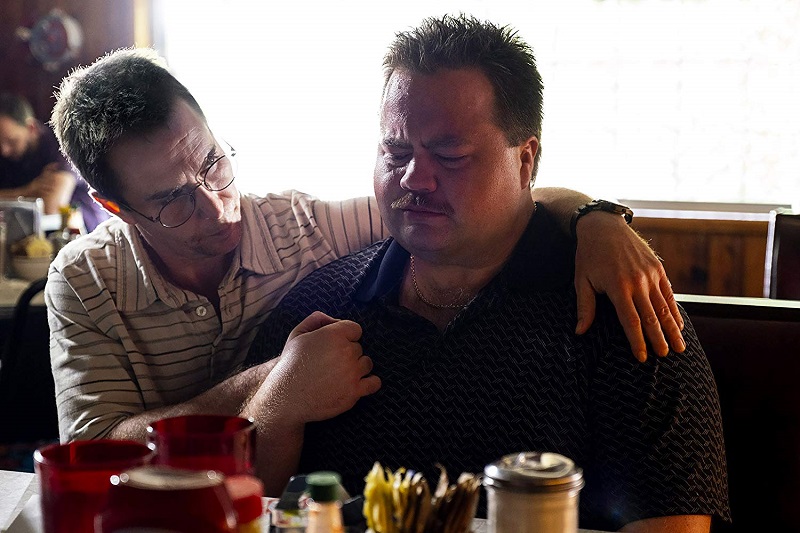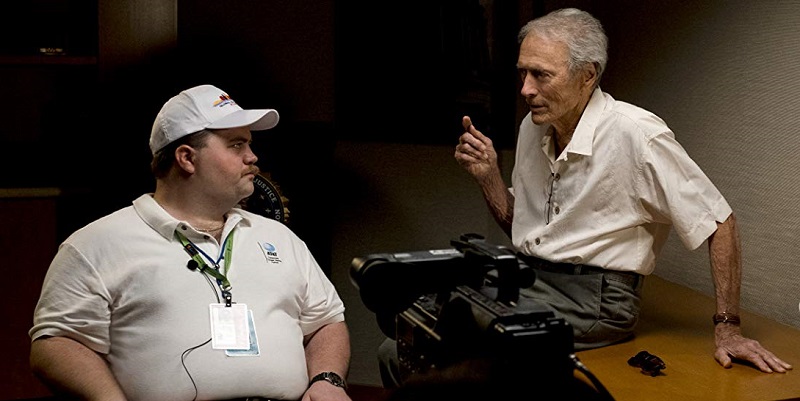Sadly, a hero named Richard Jewell was not only denied the glow and glory that comes with that moniker, but had the entire heroic even turned against him. The media and the FBI, in fact, zeroed on him as being the prime suspect for causing the 1996 Atlanta Olympics bombing at Centennial Park. Jewell was the first to discover the bomb and helped clear out the area, minimizing the casualties that could have been catastrophic. How the media and the FBI took the heroic winds out of his sails by labeling him a person of interest is the crux of Clint Eastwood’s latest, and greatest in some time, Richard Jewell—out now on DVD, Blu-Ray and digital download.

Suddenly, the budding sensational news lemmings swirled around his home that he shared with his mother—making life beyond difficult for the Jewells. Also challenging was the probing FBI, who made it clear that there was no doubt in their mind that the lone bomber theory applied here and like the guy who finds the body could be the murderer, they also believed that the guy who found the bomb was the bomber.
Clint Eastwood, never one to shy away from telling American hero stories (see American Sniper), has a personal stake in telling this story so that the man’s name can be fully known for what it should have been famous for from the beginning—selflessly saving lives. After dazzling us in I, Tonya, actor Paul Walter Hauser stars as the titular player and a star is born. Not only can I see Jewell smiling down on Hauser from heaven (he perished from diabetes complications in 2007), but those that knew him have been equally as thrilled with Eastwood’s work. In portraying the Atlanta-based aspiring law enforcement officer, the actor brought a nuanced dignity to Richard that was what he was all about.
Hauser was an impeccable choice to play Jewell. He tackles the role as one who is firmly committed to the tough task of law enforcement and knowing that those sentiments do not necessarily endear you to others. He had recently been fired from a position at a local university when he took it upon himself to go the extra mile in ways that students and some in the administration saw as intrusive. The actor embodies Jewell in such a way that what he does is never seen as overbearing of power hungry, merely a member of law enforcement who sees tackling issues over there before they become problems over here.
Luckily for him, the Olympics were coming to his hometown and they desperately needed security guards. As Hauser portrays Jewell, he couldn’t have been more committed to not only represent his native community, but the stars and stripes as well on the world stage.
Eastwood took the Billy Ray (Captain Phillips, The Hunger Games) screenplay and brought it to life in the most freshly resonant manner, something that has been sorely missing from his last few films (The Mule, The 15:17 to Paris, Sully). By taking the Jewell story back a bit before his Olympic fame, we learn much about him efficiently in the first moments of that first act. Jewell is working at a law firm as a mailroom employee, which introduces us (and him) to Sam Rockwell’s Watson Bryant—an attorney who would wind up being his best ally and best friend during the madness that followed the bombing. Those early scenes clue us in to something that is difficult to portray onscreen without potentially taking forever. This is a hard worker. He anticipates the needs of those who employ him and goes the extra mile. Most importantly, Jewell is a man of virtues and is ruled by a moral compass second to none.
That is why we as an audience can immediately be enraged by what is happening to him in the hours and days after he saved lives. Yes, he lives with his mother. Yes, he’s been known to see himself as law enforcer, judge and jury and Jewell has quite the cache of weapons. But as he points out to Bryant, this is Georgia and the better question might be, who doesn’t own a lot of guns? None of that makes him the lone bomber. Yet, taken out of context and amplified by the media and a public hungry for justice, it all added up to one explosively tragic turn of events for Jewell, his family, friends and honestly … the nation.
Oscar winner Kathy Bates is stunning as Richard’s doting mother, Bobi Jewell. The full range of her emotive command is on complete display. She is ever worried about her son. What mother isn’t? He has chosen a line of work that can potentially put him in harm’s way. Yet she believes in his vocational aptitude. So, when news breaks that there was a bomb explosion in Centennial Park and she knows her Richard was working that very event, her concern goes through the roof until she gets a call from him, letting her know he’s OK. Not only is he OK, but he’s a full-on American hero. When Katie Couric is talking about her son, staring at the television is a woman so swollen with pride … that as Bates plays her, we thought she might literally glow. Then, as the news outlets that anointed her son a hero are now circling like vultures ready for a kill, Bates’ fear and concern shows new and haunting heights. Eastwood has always been a great “actor’s director,” but what he achieves in Richard Jewell may be his best work in that arena in a decade.

Now, there’s a storyline involving Olivia Wilde’s Atlanta Journal-Constitution reporter Kathy Scruggs and FBI field agent Tom Shaw (Jon Hamm) that garnered controversy. Sadly, it is a distraction to the film. But not too much past the moment it occurs as the first act fades into the second. Scruggs gets info from Shaw (it’s alluded that she slept with Shaw to get the info) that Jewell is in fact a suspect and not a hero. She runs with it and pressures her editor to publish it to prevent the Olympics’ “local paper” being supplanted by other media outlets when they had the story first and didn’t publish.
Now, this film is based on a true story … except for this part. The notion that a female reporter couldn’t get a break on a story without dangling sex over a source is ridiculous and insulting. But it is true that the AJC did run with the story first, with “inside information from the FBI.” It also served as a catapult to the faceless entity that is “the media.” They now had a man in their crosshairs whose calls of hero have turned to death threats. As Rockwell’s attorney points out, Jewell is now at the mercy of two of the most powerful things in the world, the media and the U.S. government.
In hindsight, it’s amazing that the truth ever did come out.
Sadly, it was one of those things where the story just kind of faded into the past and we as Americans just moved forward. For Jewell and his family, he was tainted, and society saw him as such. It’s a perfect example of a newspaper accusing someone of a crime on A1. Then, they’re exonerated, and that part of the story is never published or put on the back of B17.

Eastwood, never one to think the collective of the media is worthy of praise, certainly has found a subject and a subject matter that plays to his personal strengths, and thus his filmmaking mastery. Richard Jewell truly moves. I mean, it cooks. It is a sensational look at how the mighty can be taken down with a few strokes of a pen and landing on the wrong side of law enforcement’s opinion. Although politically Eastwood and this writer drive on different highways, I can firmly say that he is spot on with his indictment of the media (and the government) here. Many reporters and law enforcement officials knew that there was no way that Jewell could have set the bomb and then walked far away to call in a warning to 911 on a payphone, then be back to the bomb in time to alert those around that it existed. Yet, the tsunami of accusations was too strong to fight against and those souls who possessed said information (like Wilde’s character) did nothing with it.
Rockwell is awesome as ever. He has a fantastic character in Jewell’s attorney. What’s fascinating is what the bombing hero needed was in a different realm of law than what his expertise lay in. Yet, because of his past experience with Jewell and the more he saw an abuse of power (by law enforcement) and abuse of due process (by the media), Bryant was the right person at the right time to represent Jewell and do his part to bring him justice.
There would never be a ticker-tape parade for Richard Jewell. He would die on August 29, 2007 from complications from diabetes. What Eastwood, Hauser, Rockwell, Bates and Ray achieve with their film is something a whole lot more resonant than a parade for a hero. Film lasts forever. As such, every single soul who witnesses Jewell’s movie—and there will be millions by the time it runs through theaters and home video—will keenly know in their heart of hearts that he was wronged.
We all now know that Jewell is a hero of the highest order and finally, justice has been achieved.

There are two bonus features on the Richard Jewell Blu-Ray, and both are worthy of the man the movie honors. I’d recommend commencing your extras journey with The Real Story of Richard Jewell. The almost seven-minute featurette finds many of the cast and crew (including Hauser and Eastwood), lauding the Atlanta-based security expert. The best aspect of this featurette is when the real-life Bobi Jewell and Watson Bryant get the spotlight. Each brings a first-hand intimacy to their contributions that further show what a gift it was that Jewell was at work at that park on that day. Even richer still is how all involved invoke Jewell’s name with the hopes of the putting the “mob justice mentality” on notice. Let’s hope something good can come from everything this American hero went through when he should have been getting ticker-tape parades.
The second featurette, The Making of Richard Jewell is a terrific, albeit too short at seven minutes, featurette that chronicles how this thing even got green-lit. Eastwood discusses his casting selection and after experiencing the marvel that is Hauser, it is easy to see why the legendary helmer cast him. But, for the filmmaker, it was a true leap of faith.
Film Grade: B+
Bonus Features: B+

